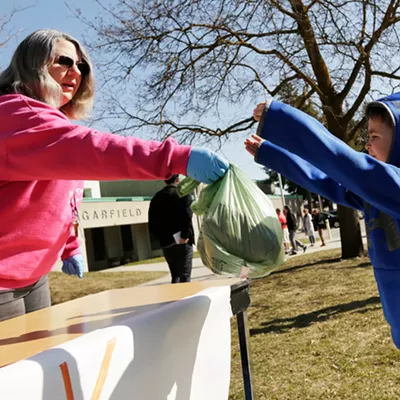
Let's start by re-emphasizing the headline: Idaho schools are not teaching students porn literacy.
That's despite the Idaho Freedom Foundation's bold claim, "Idaho's government offers 'Porn Literacy,' other corrupting practices to K-12 students," below what appears to be an expose into Idaho's use of "Education Training & Research Associates (ETR)"
Read closely and you realize that, in conservative Idaho, in the midst of a nationwide frenzy over how sex and gender is taught in the schools, the Idaho Freedom Foundation didn't have a single example of a single Idaho school actually teaching "porn literacy."
But the article, written by Anna Miller and Scott Yenor — a Boise State University professor who also writes for the far-right Claremont Institute — stoked quick outrage.
"I have said many times that we should not assume that the push to sexualize, or 'groom,' children is only happening in blue states," tweeted Chris Rufo, the activist who proudly stoked the flames of the anti-critical race theory backlash last year.
There were articles on conservative blogs like Red State and the Daily Caller. Fox News' Laura Ingraham railed about the outrage in a segment she called "Reading, Writing and Radicalism."
"Special thanks to the Idaho Freedom Foundation... for exposing what's happening in Idaho's schools," Ingraham said.
None of them, says Lauren Ranalli, director of marketing and communication for ETR, reached out to ask them for comment or to figure out if the story was accurate.
Instead, ETR got flooded with disparaging comments, she says, including "some violent and threatening."
The Idaho Department of Health and Welfare sent out a statement yesterday:
DHW does not support or fund any "porn literacy" for children in Idaho. DHW provides evidence-based, optional sex education curriculum, called Reducing the Risk, for Idaho schools. Reducing the Risk does not discuss porn literacy, and it is not a subject taught in the curriculum DHW provides.So what happened? How did this information get twisted?
Imagine the state of Idaho buying a bunch of pencils and backpacks for students at Walmart and then a bunch of bloggers writing "IDAHO BUYS GUNS FOR CHILDREN" because Walmart also sells guns.
Essentially, the same thing happened here. It's a tactic that has been used by the Idaho Freedom Foundation before — find some link between teaching something innocuous and something controversial, then pretend that they're teaching the controversial thing instead.
Idaho does use the "Reducing the Risk" curriculum from ETR, but it's a curriculum that stresses the importance of abstinence, not porn literacy.
"The more students practice effectively saying no to sex (or to unprotected sex), the more likely they'll be to use these skills in real life," the ETR website explains.
"If you look at the table of contents in Reducing the Risk, [porn literacy is] not even mentioned,” Ranalli says, "None of ETR's sexual health curricula cover pornography."
But last year they did offer one of their "3 in 30" training sessions for adults — and that word can't be italicized strongly enough — including teachers, caregivers, parents and clinicians about how to answer questions that young people might have about pornography.
"This is directly us training educators," Ranalli says.
Remember how, during sex ed, the teacher might have you and your snickering peers write down your most embarrassing questions about sex on a note card so he or she could answer them? Basically, this training was about preparing parents and students to be able to answer those in an effective way. And part of that training is not to try to shame the students or make them feel guilty for watching porn — but rather to try to unpack what they're seeing.
That wasn't training that was designed for or targeted at Idaho educators, Ranalli says, noting she doesn't know if any Idaho educators took the course.
Idaho Department of Health and Welfare spokesman Greg Stahl writes in a comment that the state has offered educators "ETR resources such as '3 in 30' as a training tool for health educators to help build their facilitation skills and knowledge on topics related to sexual health education" but those are totally optional.
When it comes to sex-ed, the prevalence and accessibility of internet pornography really has caused a ton of experts to question how schools are teaching sex ed — as pornography ends up spewing out its own shower of misinformation. That creates its own challenges for instruction, that teacher will have to navigate through, one way or another.
But, to be clear, in Idaho, that hasn't included teaching "porn literacy" to children. Instead, Stahl says, they encourage their teachers to fall back on an old classic: tell kids to talk to their parents.


























